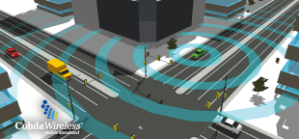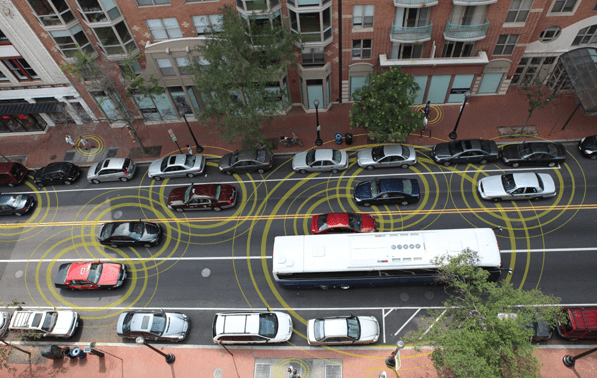Looking backwards, the automobile of today looks almost superintelligent. While some of us may have expected (read: hoped for) the flying car by 2013 and, sure, the internal combustion engine still reigns, the majority of vehicles today are basically computers on wheels. The average car today has around 50 microprocessors, give or take. But, given how quickly automotive technology is advancing, it’s clear that we’re just beginning to scratch the surface. Hell, California recently legalized road-testing of autonomous cars, and Sergey Brin thinks self-driving cars will be on public roads in the next five years.
Today, Cisco and NXP Semiconductors announced their intention to join the smart car bandwagon and help push automotive technology forward. The companies this morning announced a dual investment in Cohda Wireless, an Australian developer of hardware and software solutions for connected vehicles that allow cars to wirelessly communicate with one another (and with infrastructure) to prevent collisions — among other things.
The investment and strategic partnership essentially aims to bring the “Internet of Everything” to the automotive industry in the hopes of building a safer driving experience, reducing traffic congestion, collisions, runaway Priuses, curbing bad drivers and so on. By making car communication systems faster and more responsive — in a word, smarter — Cohda believes it can potentially prevent over 80 percent of crash scenarios, reducing injuries and fatalities on the road along the way.
In turn, Cohda is also enabling so-called “car-to-infrastructure” communication, which, in conjunction with in-car apps, attempt lower greenhouse gas emissions by changing traffic patterns, alerting drivers of hazards, like oncoming collisions, nearby out-of-control vehicles and by re-routing them to avoid traffic congestion. Via radio technology and smart sensors, car-to-infrastructure comms can enable cars to communicate with smart devices, allowing traffic signals to alert cars that the upcoming light is about to change, for example. Saving you from embarrassment and from causing a 10-car pileup because you were scanning your playlist and didn’t notice the change.
 Of course, to work at scale these types of connected-car communications require sophisticated and secure data exchange between moving vehicles, whether in the city or in Podunk — in other words, in a variety of conditions. Yet, while the technology has an array of potential applications and implications, these inter-communications systems are naturally more effective the more vehicles (and anything else for that matter) integrate the technology.
Of course, to work at scale these types of connected-car communications require sophisticated and secure data exchange between moving vehicles, whether in the city or in Podunk — in other words, in a variety of conditions. Yet, while the technology has an array of potential applications and implications, these inter-communications systems are naturally more effective the more vehicles (and anything else for that matter) integrate the technology.
So, to help get the tech on the roads, Cohda has enlisted a dozen European carmakers which have agreed to install its solutions into various lines beginning in 2015 and is currently testing integration in Detroit with eight U.S. carmakers.
While the companies remained silent on the size of their investment in Cohda, it likely isn’t chump change and was enough to bring three mature companies (and two giants) together in a strategic partnership with plans to collaborate in an effort to bring the solutions to market.
While NXP brings its semiconductor and chip tech that’s used in smart automotive, industrial, mobile and wireless applications (it’s also the co-inventor of NFC, along with Sony) and Cohda brings the software and hardware that make advanced radio communication possible, Cisco is leveraging its networking prowess to help supply the Internet. Over the last few years, Cisco has become increasingly interested in enabling the wired car, even creating a separate division dedicated to investing in and developing connected vehicle technologies.
In conversation with the WSJ, NXP’s general manager of car entertainment Torsten Lehmann said that NXP and Cisco put in a lot of due diligence and both concluded that “Cohda’s technology is by far the best.” Throwing their weight behind Cohda, the networking and semiconductor giants are on a mission to help the startup bring its technology to market. And for drivers, that should be great news — even if they have to wait.
More in the announcement here.
Top image source: U.S. Department of Transportation
